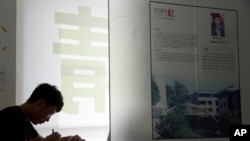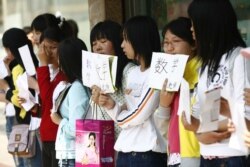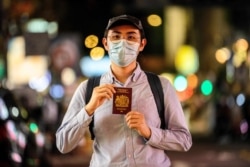For Helen Cui's daughter, a 10-year-old rising fifth grader facing the September start of classes, tutoring is a nonnegotiable part of a middle-class Beijing childhood.
Her mother, a white-collar worker in a foreign enterprise, has established a grueling weekly extracurricular schedule that includes three hours of English lessons, three hours of math lessons, three hours of Chinese lessons, one hour of swimming lessons, one hour of piano lessons, and 90 minutes of a small online English class taught by an American who tells a story and then leads the handful of kids through a discussion.
Cui estimates these additional lessons cost around $16,000 a year, an expenditure she believes is necessary to ensure her daughter's chance at the good life, an opportunity that hinges on excellent grades, excellent test scores and admission to an excellent college or university.
But new regulations issued by China's Ministry of Education are placing restrictions on private tutoring, or "cram schools." Some see this as the government's attempt to reduce the cost of raising a child as it calls for couples to have two, or even three, children after its one-child policy left China with too few workers to support the many retirees.
New regulations
The ministry created a new department on June 15 to regulate off-campus tutoring schools, with the vaguely stated goal of reducing students' academic burden. Parents understood the statement as the ministry reminding them that it was in charge, even though it offered no details.
According to the ministry's website, the Off-Campus Education and Training Department will supervise enterprises providing training and tutoring both online and offline to kindergarten through 12th grade students. The new office would guide private educational enterprises in areas such as incorporation, fees, class content, scheduling and training qualifications.
On July 2, the Beijing Municipal Education Commission announced that each district's education commission government would organize summer after-school programs for its elementary school students. Such programs had usually been organized by private-sector schools. Nationwide, at least six other major cities, including Shanghai and Wuhan, have launched similar programs.
Parents like Cui worry that privately operated after-school tutoring centers may close because of competition from the inexpensive city-sponsored programs, especially now that the Off-Campus Education and Training Department wants to lighten students' study load.
Parents are also fretting about the consequences of a spring crackdown on questionable business practices at some cram schools, fearing some may close.
On Zhihu, a Chinese social website for questions and answers that is similar to Quora in the United States, almost all the comments from parents are against the government's new regulation of cram schools.
"This is like America's Prohibition Act. You can ban alcohol, sure, but does that mean that people don't want alcohol anymore?" posted one commentator. "Same with banning cram schools. If you close them, does that mean parents don't want to send their kids to these schools? The demand is still there. It's just becoming more costly."
Another posted, "Only half the students graduating from Grade 9 are allowed to go to high schools. The other half have to go to vocational schools. There's a quota now. But what parents want their children to become blue-collar workers? They'll do everything possible to make sure their kids score well enough to be the top half."
Competition drives demand
Cui said the problem is that students are evaluated by their test scores and that won't change by restricting or closing after-school tutoring programs. As long as the college-entrance exams remain highly competitive, students will need after-school tutoring.
"If we can't go to those after-school programs and we don't have the energy to teach our children ourselves, then we will have to find one-on-one tutoring," said Cui. "It is three or five times more expensive than group classes. It makes us more anxious. We (would be) spending more money. And we don't have a choice to not go."
After-school tutoring took off in the late 1990s as China transformed itself from an economy based on agriculture and industry to one that included a growing information sector and a vast industrial presence. The result was even more intense competition in education and a greater emphasis on university degrees. Many parents turned to after-school cram schools fearing that the typical school curriculum didn't do enough to help children maximize their potential.
The official People's Daily in 2016 quoted the Chinese Society of Education as saying a conservative estimate valued the "out-of-school education and training industry" that employed thousands of people at approximately $123.5 billion.
According to a report released in July 2020 by the Chinese Academy of Sciences' Key Laboratory for Big Data Mining and Knowledge Management, K-12 online education alone will have a market size of $23 billion by 2022.
Chinese couples say the cost of having children is one reason they are having fewer babies. In May, census data released by China's National Bureau of Statistics showed a fertility rate of just 1.3 children per woman in 2020, a new low. China had 12 million newborns in 2020, down by 18% from 2019. 2020 is the fourth consecutive year that Chinese births have declined.
Cost of tutoring adds up
For Chinese middle-class urban parents, extracurricular classes are a requirement, much like regular medical checkups. But the cost of extra classes adds up.
According to a 2019 Shanghai Academy of Social Sciences report, raising a child from birth through junior high school costs an average family living in Shanghai's upscale Jingan district $130,000, with $78,713.42 of that budgeted for education, as Reuters reported. Low-income families in Shanghai, which have annual incomes of about $7,700, spend more than 70% of that on their only child, the report said.
Michael Ma, who works in the after-school education sector and asked VOA not to use his real name for fear of retaliation, suggested that since the cost of having children includes educating them, regulating pricey after-school programs is one way for the government to lower costs.
Cui said that she and her husband didn't plan to have a second child.
"The older your children get, the more money you need to spend. We don't have that much energy," she said. "People I know in big cities don't plan to have a third child, anyway. Having one is already tiring."
On April 25, the Beijing Municipal Administration for Market Regulation issued $77,000 fines to four extracurricular enterprises for pricing violations and false advertising. One of them was New Oriental Online, the digital offering from New Oriental, the self-described largest provider of private educational services in China. On June 1, the government issued a total of $5.6 million in fines to 15 cram schools for the same violations.
Bingqi Xiong, president of the 21st Century Education Research Institute, a nongovernmental education think tank in Beijing, said the examination system should be reformed to reduce the need for extracurricular schooling.
"The college entrance examination system that evaluates students with a single score is why parents are very anxious," he said. "Under this evaluation system, all parents want their children to get higher grades and higher rankings in order to get into better universities."
Ma said the industry was growing too fast, spurred on by outside investors seeking a return on their money rather than just high scores for customers' children, even though top marks are the measure of success for students, their parents, the cram schools and university admissions officers.
"In China and other countries, after capital influx, institutions put all their energy into attracting more users with low prices and then go on to raise more money," Ma said. This logic is wrong, and the market is problematic."
The government guidelines intend to regulate the after-school programs, not close them, he added.
"The government hopes that through this regulation and change, public schools with public teacher resources will play a major role," Ma said. "And the market-oriented elements should play a supporting role for public schools."
Some information for this report came from Reuters.






